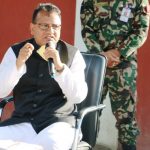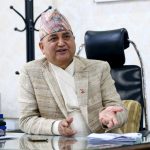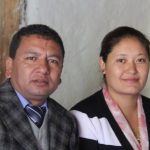Deep Raj Sanyal
25 July, Kathmandu : This week, the country witnessed yet another democratic exercise in the constitution-writing process after the second Constituent Assembly election of 19 November 2013, as the CA sent the preliminary draft of the constitution to all the 240 electoral constituencies for public feedback.
In response, thousands of people put forward their opinion and suggestions on diverse aspects of the constitution. People also had the option to feed in their suggestions to the Constituent Assembly by phone, fax, e-mail and post.
And as data suggest, there was overwhelming response from the people to the draft constitution in the public consultations held in the districts. According to the CA Secretariat, it received 26,581 suggestions including 17,395 on its website, 5560 through e-mail, 973 via fax, 2,415 on the toll-free phone and 153 directly submitted to the CA Committee on Citizen Relations and Public Opinion Collection. Apart from these, 85 different organisations made their submission on the draft constitution directly to CA Chair Subas Chandra Nembang.
The public consultations on the draft constitution went ahead smoothly except for some sporadic instances of obstructions caused by a few parties and groups unhappy with the draft constitution. Now, that the task of collecting people’s feedback on the draft constitution is over, how these loads of suggestions from the people are to be assimilated into the constitution has become the moot question.
While the types of comments that were put forward by the people cannot easily be generalised, there were some common tendencies that were evident. The people of the Madhesi, Janajati and marginalized groups said that the names and demarcation of the boundaries of federal provinces should be determined before the constitution is promulgated whereas a majority of the people from the hill high caste groups, who made their submissions, wanted the provision of secularism in the draft of the constitution to be scrapped and replaced with Nepal as a Hindu state or at least a State with religious freedom.
There was also a majority suggestion from the people on such key topics as citizenship provisions, federalism, state restructuring, electoral system, the form of government and fixing threshold for parties, among others.
Through their suggestions, people have put forth their opinions in no uncertain terms on the need of amending certain provisions related to these issues mentioned in the draft constitution. This should be taken in positive light as it will make the new constitution more acceptable.
In a democracy, the voice of the people is taken to be the voice of the nation. In this light, the opinions and suggestions from the people on the draft constitution hold significance. The Constituent Assembly and the political parties represented there should take heed to the people’s say. This would go a long way in making the new constitution a widely-accepted document.
Although it would be hard to reconcile the parties’ differing ideological lines in terms of their stance on certain issues, they should rise above partisan interest and work towards delivering a constitution that ensures freedom, justice and prosperity for all. This exercise of collecting people’s feedback has shown that the people are far more pragmatic and progressive on the issue of constitution than the party leaders are.
After this massive exercise of collecting public opinion on the draft constitution, now the ball is in the court of the political parties and the Constituent Assembly. This is also the time for the major parties to take the disgruntled parties into confidence. They should reach out to them, hold dialogue and consultations, and address their concerns. This might require more time. But the parties should not make the mistake of rushing through the constitution-making process.
Even though the feedback process may yield some insight, the drafters of the constitution should think with open mind and invite leaders of the indigenous nationalities communities, Madhesi parties and other fringe parties for discussion and welcome their feedback to prevent large-scale unrest in the country in future. They should try to accommodate all sides as far as possible so that all will have a feeling of ownership over the new constitution.
The country is passing through a political transition for long. There is the need to end this transition and take the country on the path of economic development. This would be possible only if we have a workable constitution. People have waited for eight years now for a constitution to be written by their elected representatives. This is a dream that the people had for the last 60 years. Materialization of this dream seems so close at hand now with the first draft of the constitution having gone through the process of public consultations.
If the submissions made by the people on the draft constitution are not properly entertained and addressed, then, these agendas would be highjacked by religious and regional parties. There will be a surge of such communal parties in the country and the major political parties’ power will wane. The rise of communal forces will not be good for the country and the people in the long run. RSS






